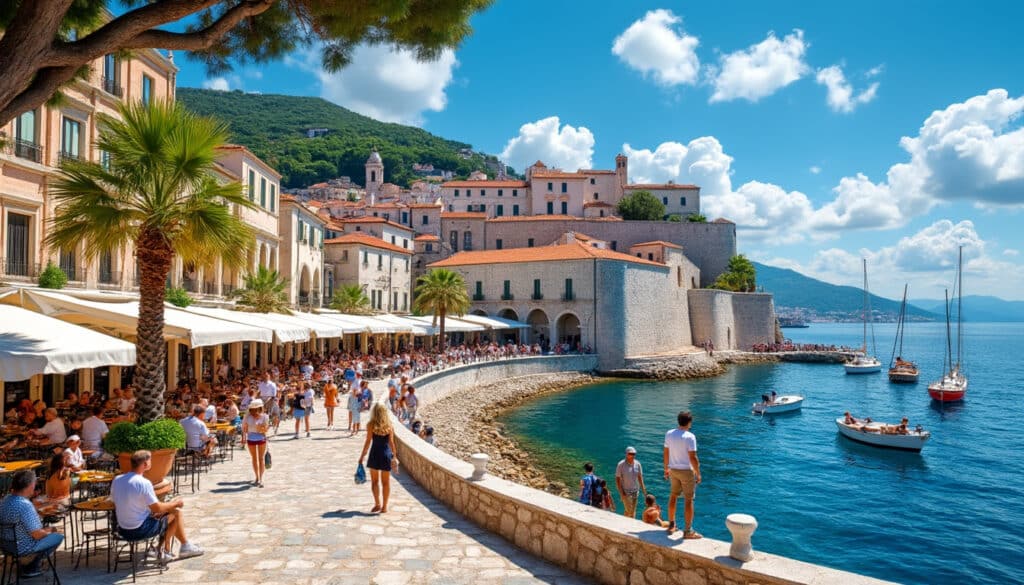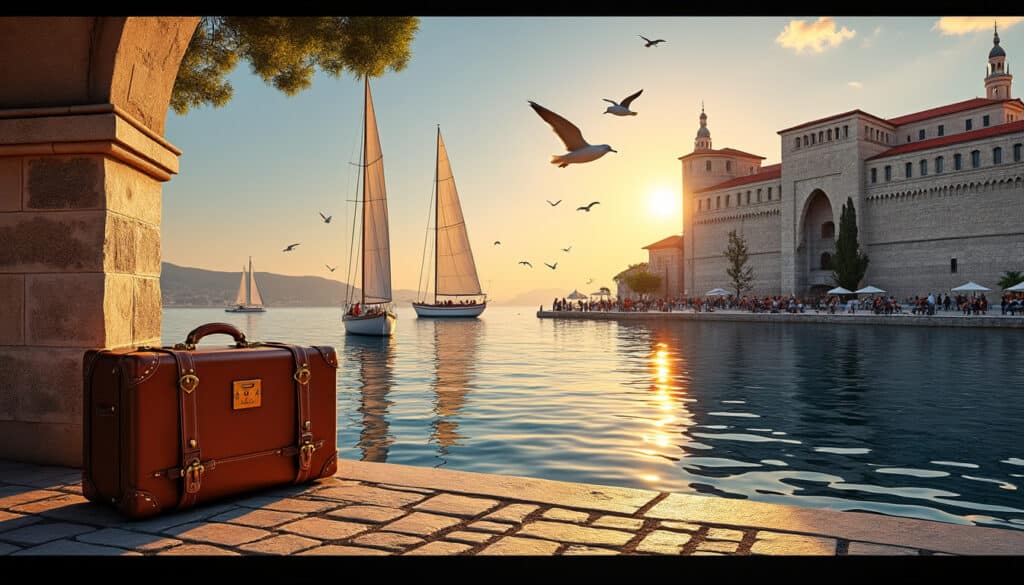In the heart of Dalmatia, Split stands as a gateway to the Adriatic, renowned not only for its stunning coastline and ancient architecture but also for its role as a pivotal transportation hub. The train station in Split, a bustling locus of movement, reflects the blend of historical significance and functional design. Passengers arriving here can experience a subtle blend of local charm and practical convenience. While the station may not offer the high-speed connections of larger European counterparts, its services remain a crucial element for those crossing Croatia by rail. This article delves into the intricacies of train travel in Split, from the historical evolution of its rail network to the contemporary experiences of travelers in 2025.
The Historical Journey of Split’s Rail System
Split’s railway history is a rich tapestry that dates back to the late 19th century. The first railway connection was established in 1877, linking Split to the village of Siverić in the Dalmatian hinterlands. By 1888, this line extended to Knin, further tightening the bonds between coastal and inland Croatia. The early 20th century saw the introduction of a narrow-gauge railway service connecting Split and Sinj, a route that became ever more important for local trade and mobility.
This historical framework was momentous for Split’s development. The strategic positioning of the Split railway station on Obala Kneza Domagoja, next to the central bus station and the port, underlines its importance as a logistical hub. Although the station might lack the high-tech facilities of larger international stations, its proximity to key transit points ensures maximum convenience for travelers.
The evolution of railways in Croatia saw significant expansions with the line reaching Zagreb via Gračac by 1925, thus integrating Split more effectively into the continental network. Nonetheless, despite these developments, the railway network in Croatia has historically been more limited compared to Western Europe, focusing on connections between major cities like Zagreb, Rijeka, Pula, and, of course, Split. Split’s station itself was central to facilitating these connections, becoming a significant node in the national railway network.
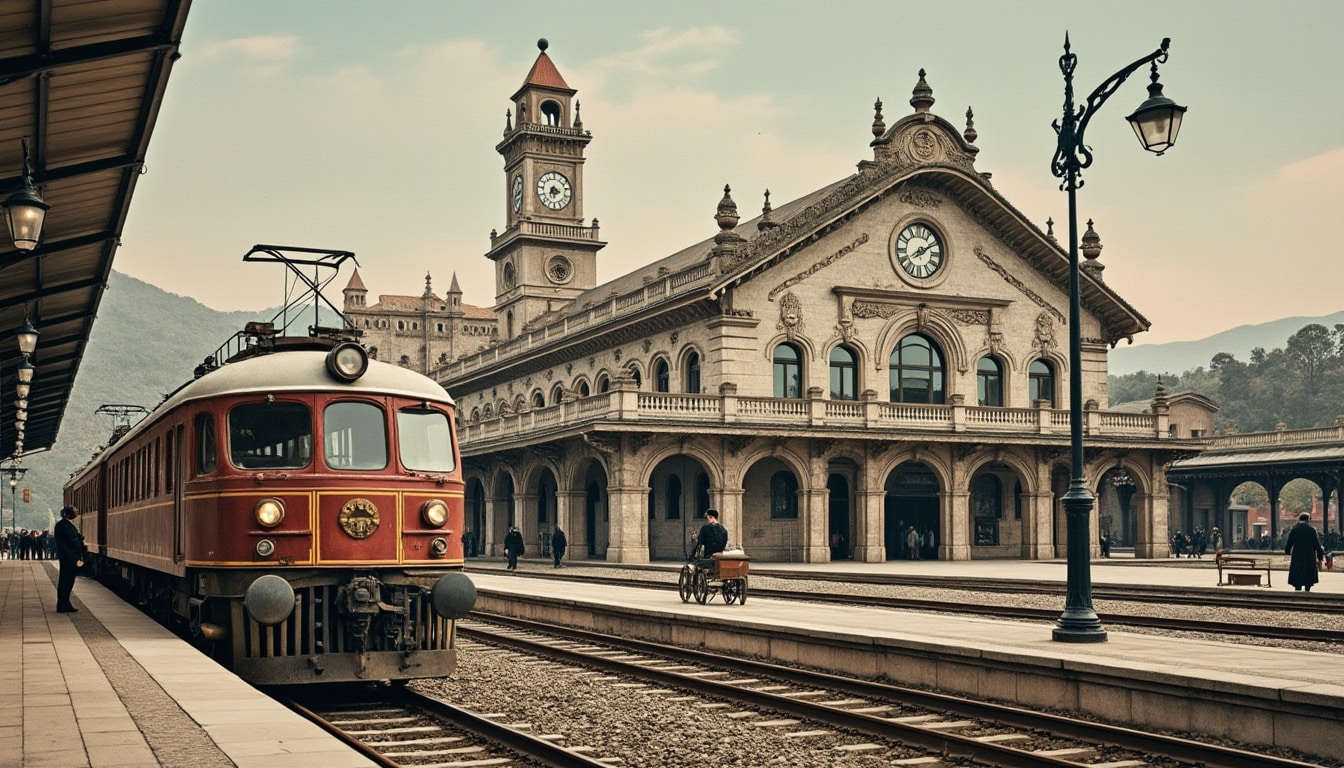
Throughout its history, Split’s railway station has undergone various modifications and upgrades. These changes, though often subtle, have played a crucial role in adapting the location to modern travel needs while preserving its historical charm. The blending of past and present is visible in the architectural details and the design of the waiting areas, creating a unique experience for travelers who are both history aficionados and modern tourists.
Today, the station provides services and links that are essential to both locals and tourists. It serves as a departure point for exploring nearby regions and as an arrival hub for those interested in experiencing Split’s stunning beaches and cultural landmarks. Despite the limitations and delays that sometimes characterize train travel here, the journey often becomes a tour through Croatia’s beautiful landscapes, offering a glimpse into the country’s diverse topography and cultural tapestry.
- 1877: First railway connection to Siverić
- 1888: Extension to Knin
- 1903: Narrow-gauge service to Sinj introduced
- 1925: Connection to Zagreb established
The journey through rail in Split is as much about the travel as it is about embracing a unique historical narrative. This narrative continues to enrich the experience for those stepping off the train in Split, providing a starting point for further exploration of Croatia’s wealth of attractions.
Practical Aspects of Train Travel in Split
For those venturing into or out of Split via rail, understanding the practicalities of using Croatian Railways is crucial. Managed by Hrvatske zeljeznice (HZ), the rail network offers different classes and services to suit varying needs. However, travelers often consider other transport alternatives due to the relatively slower and less frequent train services compared to buses and cars.
Among the types of trains on offer, local trains typically have unreserved second-class seats, which provide more budget-friendly options for daily commuters and travelers on a tight schedule. On the other hand, express trains require reservations and typically offer faster travel times, although still not competitive with high-speed trains elsewhere in Europe.
- Local trains with unreserved second-class seats 🚉
- Express trains requiring reservations 🚂
- Executive trains featuring only first-class seating 🎩
For those planning journeys on domestic routes such as the Intercity (IC) Zagreb–Rijeka/Osijek/Cakovec and the ICN train from Zagreb to Split, reservations become even more crucial. These routes, while offering efficient travel between major hubs, can become crowded, particularly during peak tourist seasons.
It’s important to note that most train travel to Croatia from other European countries involves multiple transfers, which can add significant time to the journey. For instance, routes from Venice to Split can take up to 20 hours with at least three transfers. Comparatively, travel by land, air, or sea may offer more convenient alternatives when time is a premium.
| Route | Travel Time | Transfers Required |
|---|---|---|
| Venice to Zagreb | 7-10 hours | 1-2 switches |
| Venice to Split | 15-20 hours | 3 switches |
| Rome to Zagreb | 12-15 hours | 1-2 changes |
| Milan to Zagreb | 10-12 hours | 1-2 changes |
The strategic location of Split’s main train station enables easy transitions to other forms of transport. Despite the limitations in train services, the adjacent bus station offers nearly 40 departures a day, significantly overshadowing the infrequent train services. Furthermore, buses are generally cheaper and faster, providing a compelling argument for travelers to consider them as a primary mode of travel. Those preferring the scenic coastal routes might also opt for ferries, particularly for trips originating from Italy.
Railway Station Experience in Split
Visiting Split’s railway station offers travelers more than just a transit point; it presents a cultural vignette reflective of Croatia’s unique blend of past and present. Located at Obala Kneza Domagoja 11, the station’s proximity to major transportation nodes makes it a pivotal point for numerous travel itineraries. However, travelers should manage their expectations regarding the amenities available at the station.
Despite being a smaller station in comparison to others in Europe, the Split railway station is functional and straightforward, catering to the essential needs of travelers. Facilities such as ticket offices, waiting rooms, and cafes offer a level of comfort sufficient for the brief waiting periods typically experienced here. Yet, passengers should note that high-end conveniences found in larger stations might be lacking.
- Essential facilities: ticket offices, waiting areas, and cafes 🍵
- Located close to the port and central bus station 🚌
- Effortless transition to nearby public transportation options 🚶♂️
While there may be a limited range of services at the station, its charm remains undeniable. The architecture of the station adds to the allure—a visual reminder of its historical lineage that continues to captivate both tourists and locals alike. For those needing more information, the station provides maps and schedules online, although primarily in Croatian.
Interacting with local staff and fellow travelers is often cited as one of the more enjoyable parts of visiting the station. It provides insights into local customs and an opportunity to exchange travel tips. Additionally, travelers can explore nearby shops, ensuring that last-minute essentials for their journey are available. The location’s centrality also allows tourists to explore Split’s renowned local attractions or enjoy a leisurely stroll along the nearby Riva Promenade before embarking on their train journey.
Alternatives and Enhancements for the Future
As we look towards 2025, the prospect of improvements and expansions for Croatia’s rail network continues to be a topic of considerable relevance. While current train speeds and connectivity are limited, the potential for enhancements remains significant, promising a more integrated and efficient travel network in the years to come.
Given the delays and slow travel times frequently associated with rail travel in Croatia, the demand for alternatives is increasing. Buses, for instance, remain a popular option due to their affordability and frequency. Additionally, car rentals offer the flexibility of schedule and route, allowing travelers to customize their experiences further.
Moreover, the accessibility of Split’s train station makes it a well-suited point for experimentation with new travel technologies and methodologies. The adoption of greener, more sustainable forms of transportation, alongside an increasing reliance on digital tools for booking and navigation, provides a pathway toward enhancing passenger experiences.
| Alternative | Pros | Cons |
|---|---|---|
| Buses 🚌 | Frequent, affordable | Longer travel time |
| Car Rentals 🚗 | Flexibility, independence | Cost, driving concerns |
| Ferries 🛳️ | Scenic routes | Limited schedules |
| Flights ✈️ | Speedy travel | Costly |
Furthermore, companies like RailEurope and Trainline are continuously working to improve the ease of booking and planning train journeys across Croatia and Europe. With innovations in digital bookings through platforms like Omio and Loco2, travelers can now more easily coordinate their multi-modal transit options.
The future of train travel in Split may also include the integration of services by international operators such as FlixTrain and Eurostar, enhancing connectivity with other parts of Europe. As infrastructure matures, these developments can provide the necessary boost to a system that holds significant potential.
The Scenic Appeal of Train Travel to Split
Despite the limitations and challenges, there is a unique scenic appeal to traveling by train to Split. The journey, weaving through the Croatian landscape, offers an unparalleled opportunity to witness the country’s natural beauty. From the windows of the train, passengers can catch glimpses of majestic landscapes reminiscent of Swiss mountain ridges, particularly along the winding routes.
The architectural design of the trains themselves complements the scenic allure. Modern carriages, introduced as recently as 2007, resemble sleek trams more than traditional trains. These carriages feature expansive windows, ideal for panoramic views, and are equipped with comfortable seating arrangements that contrast sharply with the slow, meandering travel pace.
- Panoramic windows for stunning views 🏞️
- Comfortable, tram-like modern carriages 🚋
- Enchanted views of Croatia’s diverse landscapes 🌄
A journey from Zagreb to Split may take a longer time due to the insufficient infrastructure for high-speed travel, but it is precisely this leisurely pace that allows passengers to appreciate the transition of scenery—from urban centers to lush, seemingly untouched natural expanses.
Adding to the traveler’s delight, the Split station’s hostess services offer an additional layer of comfort, providing a welcoming and friendly atmosphere upon arrival. While the train might not be the fastest means of travel, the experience it offers is unforgettable, grounded in the tranquility and raw beauty that is uniquely Croatian.
FAQ
- Can I buy train tickets online for travel in Croatia? Yes, platforms like RailEurope, Trainline, and Omio allow for online bookings. However, Croatian Railways also provides an in-country option, although the website may primarily be in Croatian.
- Are there high-speed trains from Zagreb to Split? Currently, there are no high-speed trains on this route. The trains available are primarily express or passenger trains, offering comfortable but slow travel.
- What alternatives to trains are available from Split to other Croatian cities? In addition to trains, buses and car rentals are popular options. The bus network is frequent and affordable, and car rentals offer flexibility for travel.
- Is the Split train station close to attractions? Yes, it is conveniently located near the port and central bus station, allowing easy access to nearby attractions and the city center.
- Are there international connections from Split by train? While direct international connections are limited, travelers can reach Split through Zagreb when coming from other European cities. Consult platforms like PKP Intercity or Eurostar for more routing options.

Split is an enchanting city with an impressive blend of history, culture, and natural beauty. This Croatian gem, nestled along the stunning Adriatic coast, offers a plethora of attractions and activities that make it a must-visit destination. Whether you’re wandering…
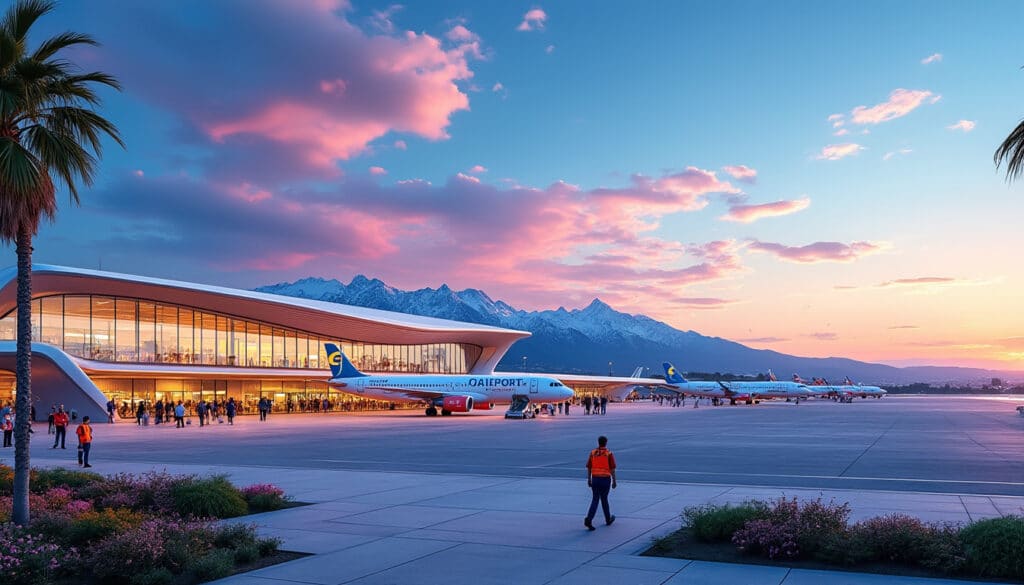
Split, a gem nestled on the Adriatic coast of Croatia, is increasingly becoming a popular travel destination due to its rich history, stunning landscapes, and vibrant culture. As interest in this region grows, so does the necessity to navigate its…
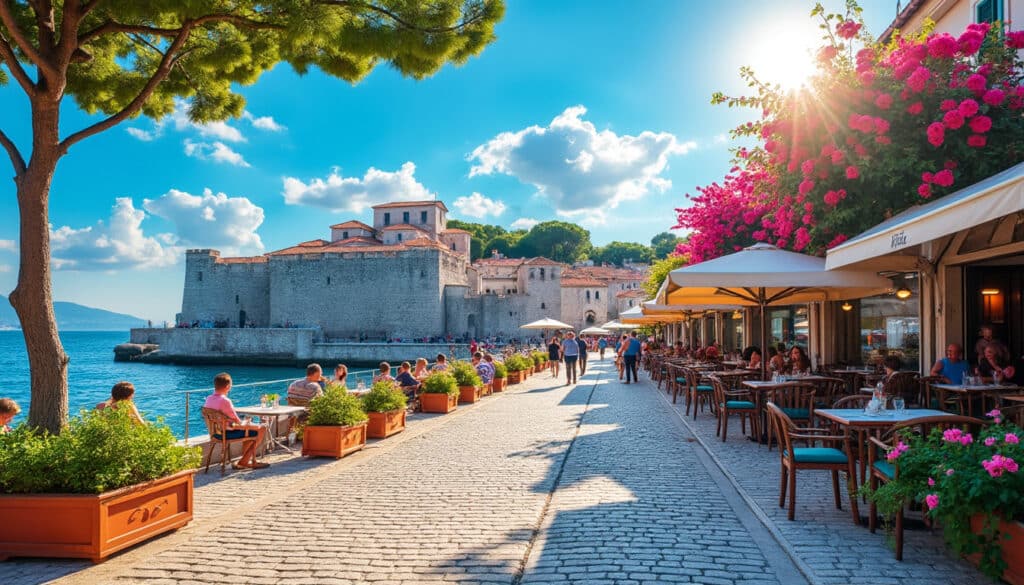
Located along the stunning Adriatic coastline, Split offers travelers a vibrant blend of history, natural beauty, and unique local culture. Nestled within Croatia’s Dalmatian region, the city offers a warm embrace of turquoise waters, ancient ruins, and bustling streets, welcoming…
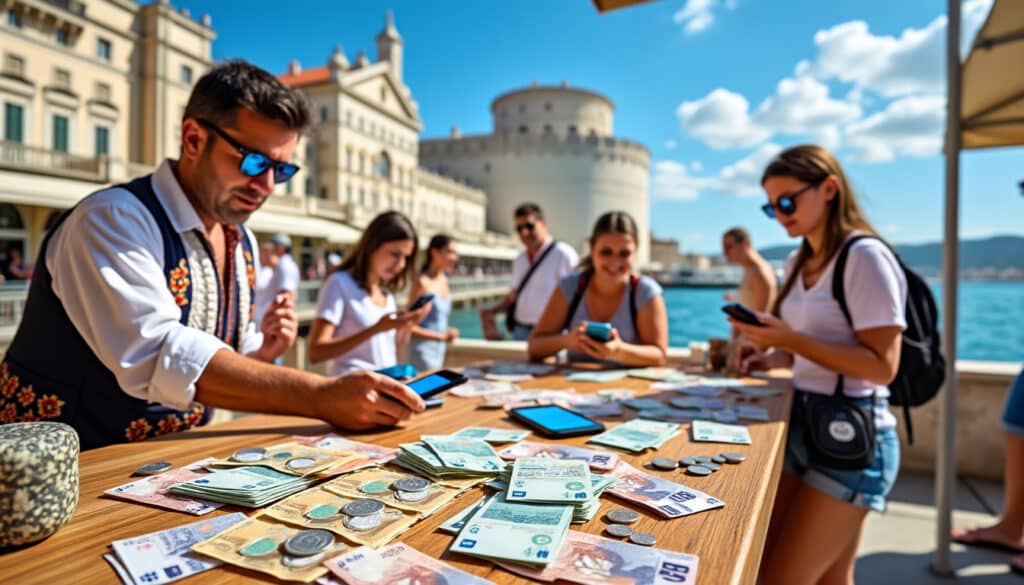
Currency and payments in Split
Split, the vibrant coastal city in Croatia, is not only a resort paradise but also a hub for cultural interactions. As it marries its rich history with modern amenities, one aspect that often intrigues visitors from around the globe is…
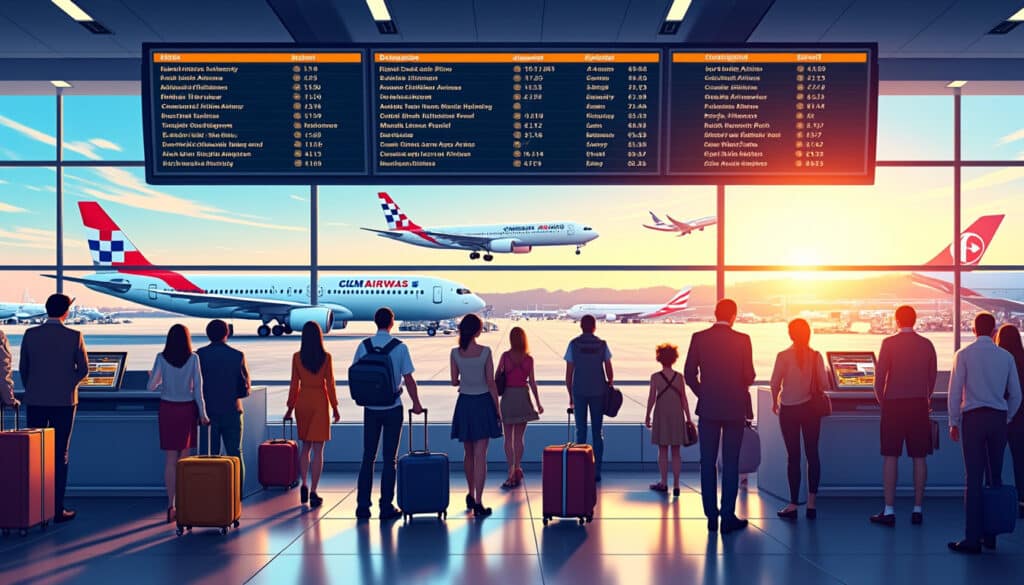
Flights to Split and airline options
Explore the growing opportunities for air travel to Split, a stunning coastal city in Croatia. As tourism to Split continues to rise, there is an increased demand for flights that connect people to this mesmerizing part of the Adriatic, whether…
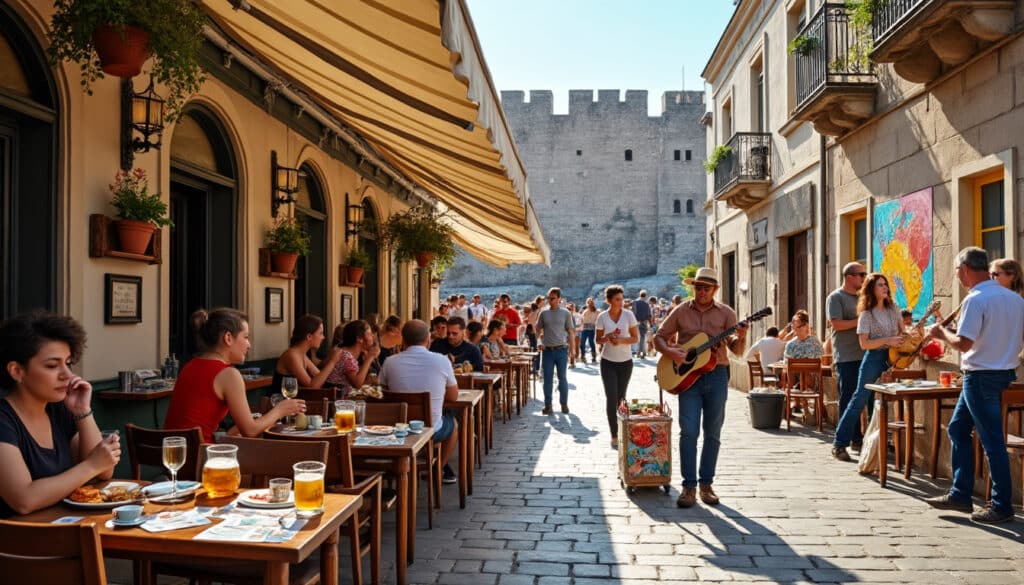
When visiting the historic city of Split, Croatia, travelers often find themselves engrossed in the myriad cultural experiences the city has to offer. However, one of the practical aspects that visitors need to consider is how to handle currency and…
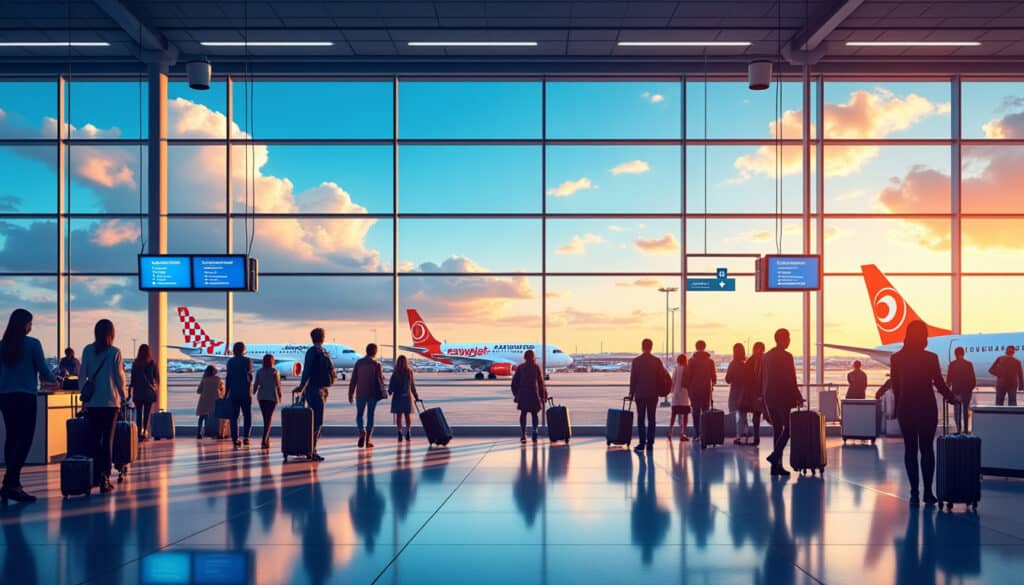
Flights to Split and airline options
The picturesque city of Split, Croatia’s vibrant coastal gem, is a place teeming with history, culture, and natural beauty. Situated along the stunning Dalmatian Coast, it captivates visitors with its ancient Roman architecture and breathtaking seaside views. As travel interest…

How many days to stay in Split?
🌅 Nestled along Croatia’s stunning Dalmatian coastline, Split beckons with its blend of ancient history and modern charm. Visitors to this coastal gem often seek guidance on the optimal length of stay to truly appreciate its rich offerings. While some…

Situated along the stunning coastline of Croatia, Split is a city that captivates travelers with its rich history, vibrant culture, and breathtaking views of the Adriatic Sea. But, for those planning a visit, one question often arises: Is Split expensive?…

Split, a city rich in history and charm, attracts travelers for its unique blend of ancient architecture and vibrant, modern culture. As visitors stroll through its cobblestone streets, explore the ancient UNESCO World Heritage Site of Diocletian’s Palace, or soak…

Passport and travel documents for Split
As the sun kisses the vibrant coastline of Split, Croatia, many travelers are preparing their journey to this picturesque city. Whether you’re planning a leisurely stroll along the Riva promenade or exploring the historical tangles of Diocletian’s Palace, ensuring that…
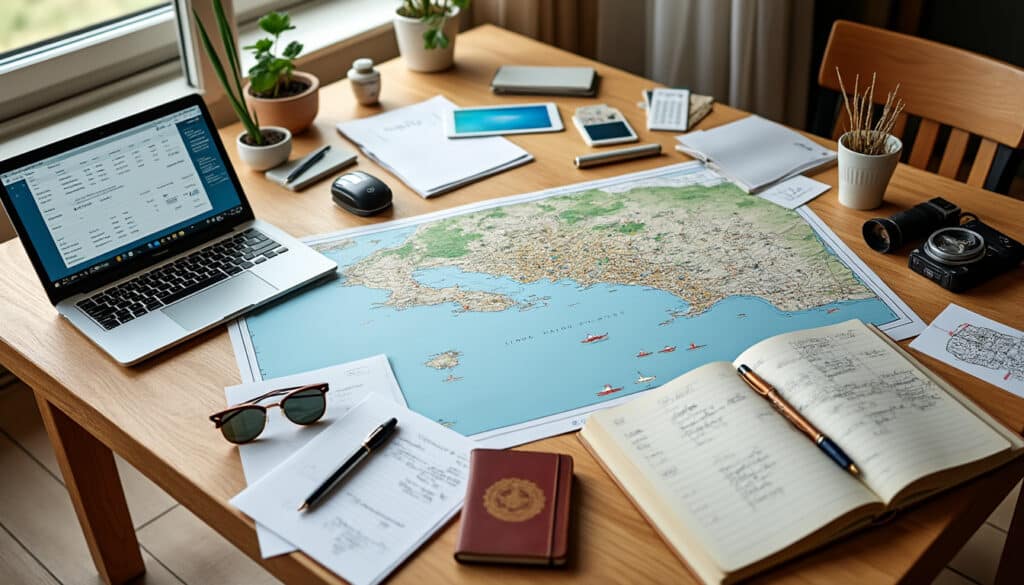
Split, a stunning city nestled on the Dalmatian coast of Croatia, beckons travelers with its ancient Roman ruins, vibrant Mediterranean atmosphere, and breathtaking coastal scenery. As you plan your trip to Split, consider the city’s rich history and modern allure…
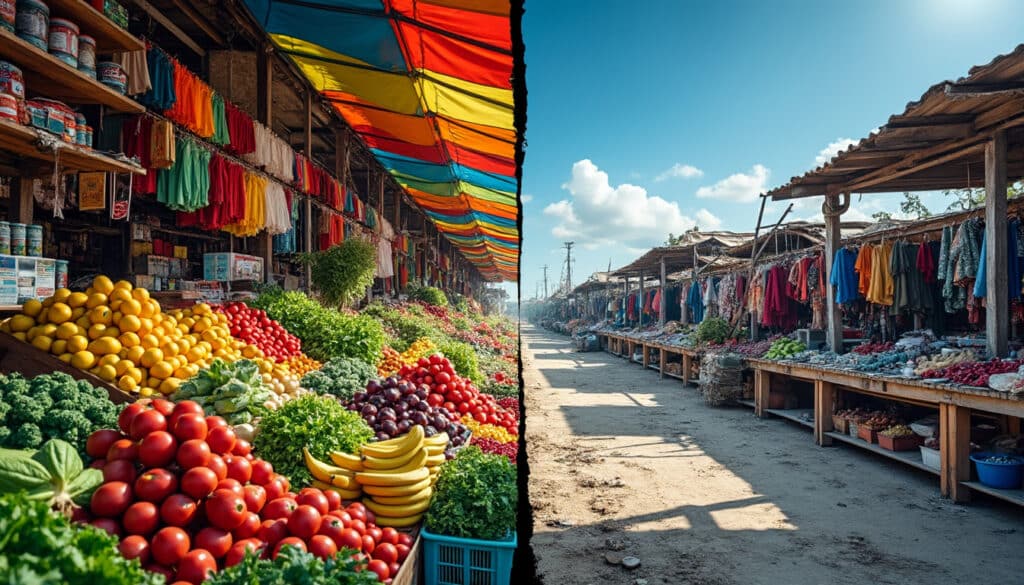
Planning a trip to Split City in 2025? Let’s delve into the economic landscape of Croatia’s stunning coastal city where the allure of Mediterranean life meets practical affordability. Embark on a journey through Split’s price spectrum—from savoring regional delicacies at…

Public transport and payments in Split
Without a doubt, Split — a captivating coastal city renowned for its rich history and scenic beauty — is also noteworthy for its efficient public transport. The public transportation system, known as Promet, is an integral part of the daily…
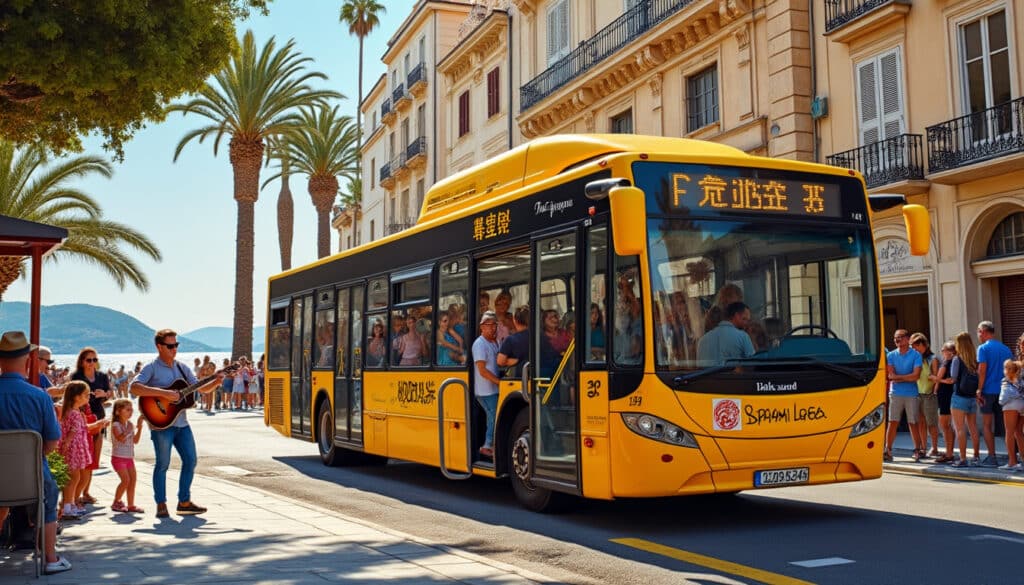
Split, Croatia’s stunning coastal city, offers not only breathtaking views and historical landmarks but also an evolving public transport system. As the city experiences a rise in tourism and expansion beyond its ancient walls, understanding how to efficiently navigate its…

Shopping and delivery in Split
Split, a stunning coastal city in Croatia, offers a unique blend of historical allure and modern conveniences. As time progresses, the city has woven itself into the fabric of modern life, with shopping and delivery services catering to both locals…
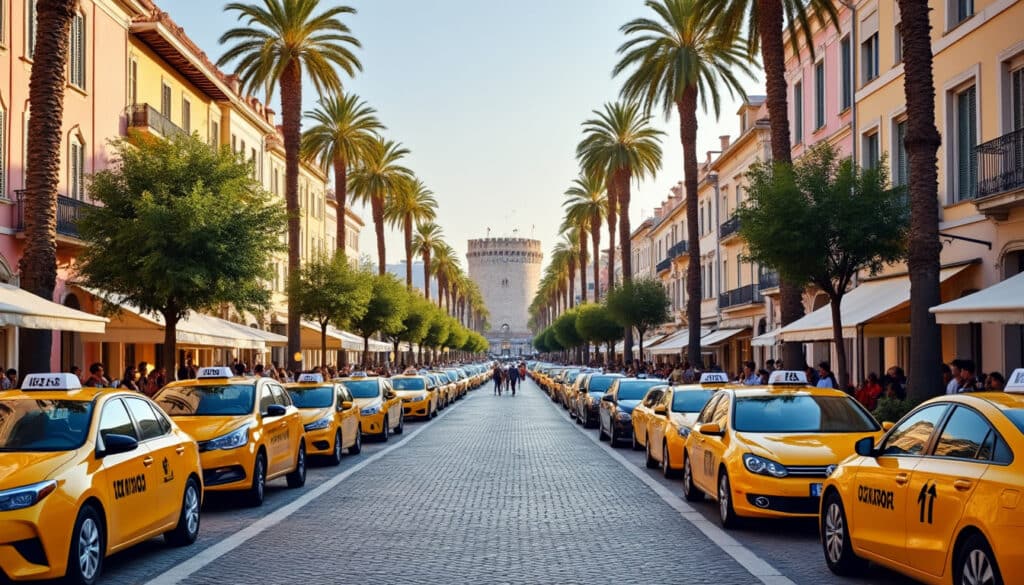
Taxi and cab services in Split
Split, a stunning coastal city in Croatia, has plenty to offer when it comes to exploring its charming streets, historic sites, and pristine beaches. As a traveler, one of the main considerations is transportation, and in Split, taxi and cab…
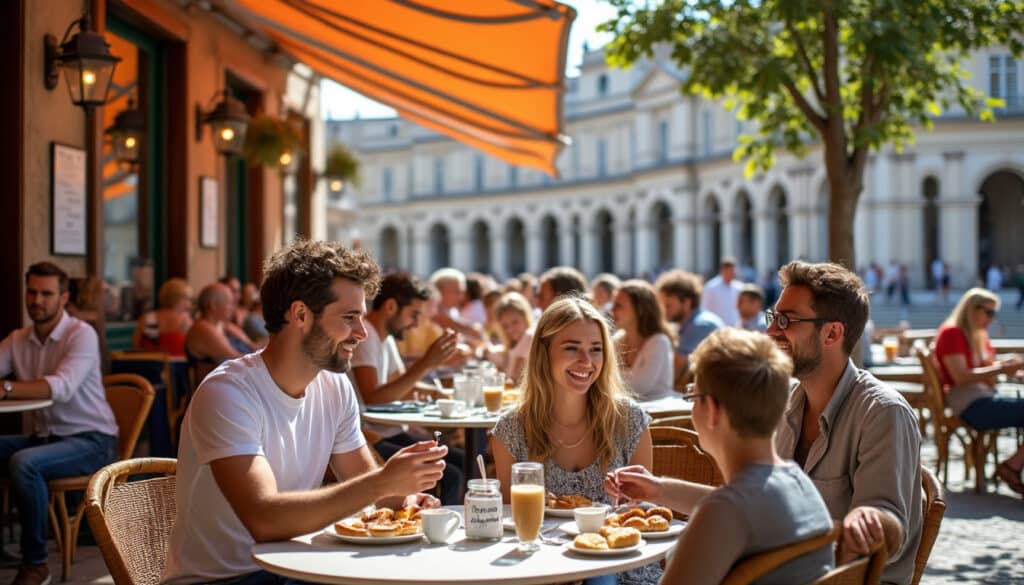
Tipping and local payment habits in Split
With the rising popularity of Split as a frequented destination, understanding the nuances of tipping and payment habits in this vibrant city has never been more important. As a tourist, navigating local customs can be challenging, but a good grasp…
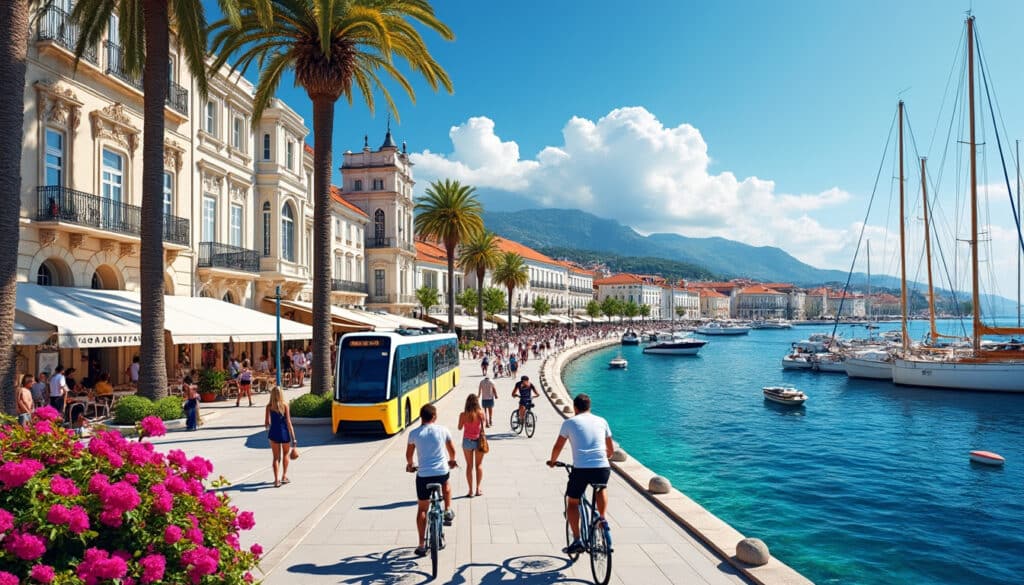
Transportation and mobility in Split
Nestled on the stunning Adriatic coast, Split is a city that effortlessly blends ancient history with modern lifestyle. As Croatia’s second-largest city, Split is not only a major tourist hub but also a vital economic center. With its unique mix…

Split, a stunning Croatian city on the Dalmatian Coast, beckons travelers with its rich history, breathtaking landscapes, and enchanting Mediterranean allure. As one of Croatia’s most visited destinations, a well-prepared travel checklist ensures you make the most of your time…
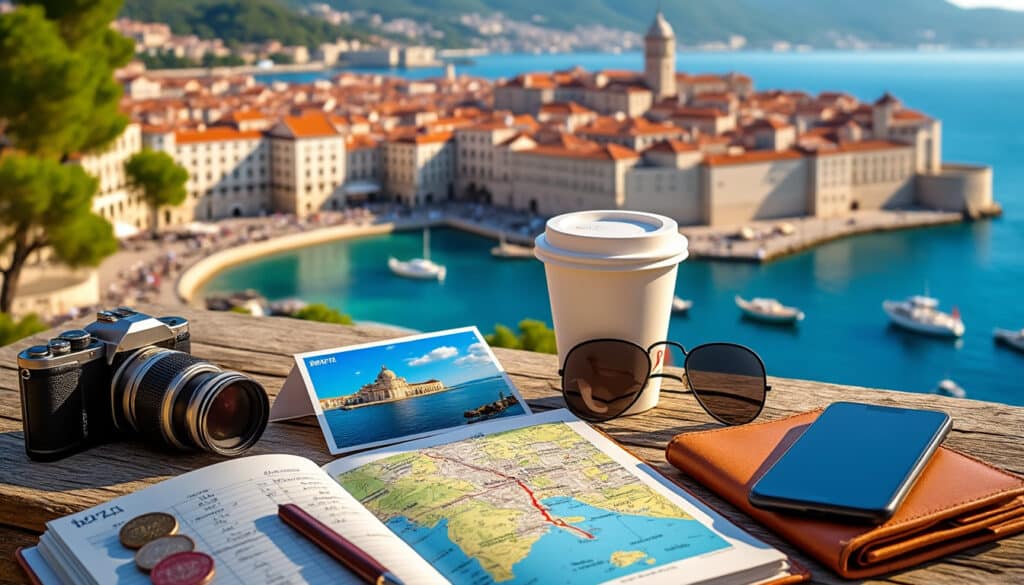
Trip costs and budgeting in Split
Split, a gem of Croatia nestled on the shimmering Adriatic coast, is more than just a postcard-perfect destination. Its historic Diocletian’s Palace, vibrant street scenes, and bustling waterfront make it a magnetic attraction for travelers worldwide. Yet, the million-dollar question…

Split Airport, known locally as Zračna luka Split, stands as a bustling gateway to Croatia’s enchanting region of Dalmatia. Serving as a crucial hub for both locals and tourists, it offers a wide array of domestic and international flights operated…

With Split’s rich history, stunning architecture, and vibrant culture, it has become a must-visit destination for travelers around the world. However, before embarking on a trip to this enchanting city, understanding the visa requirements is crucial. Croatia, now a member…
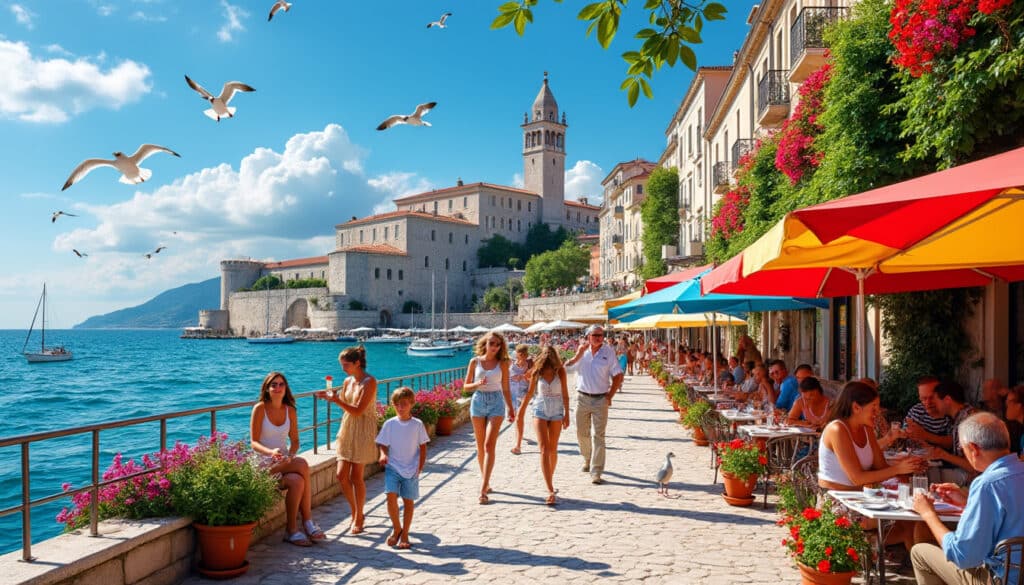
When is the best time to visit Split?
Split, Croatia, a city rich in history and vibrant energy, offers a spectrum of experiences that change with the seasons. Whether you’re drawn in by the historical intrigue of Diocletian’s Palace or the allure of the Adriatic’s azure waters, the…



